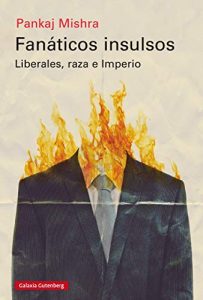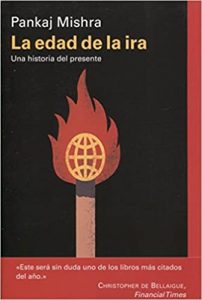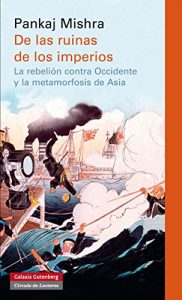Even in the literary sense, it may be that we tend towards a maddening ethnocentrism, punished even more in this case with a certain cultural elitism. We are fascinated by finding the exotic taste in a novel by Murakami because Japan, even being a distant country, is a country of the first world, that is, it belongs to our «ethnic group» of the fortunate inhabitants of the planet ...
In the opposite sense and to defend the position that literature cannot understand social conditions or strata, it should also be noted that The Indian literary pool is not the most prolific in the world despite representing a seventh of the world's humans. Maybe since Rudyard Kipling little else we have known clearly Indian. Because authors of Indian origin like Rushdie and a few others are already making themselves known as British thanks to cleverly forged ties with the Commonwealth.
So the irruption of an explicitly Indian narrator in form and substance as Pankaj Mishra It turns out to be a delightful discovery once, in your brief forays into fiction, you let yourself be carried away by that life-spattered realism on the banks of the Ganges or between the Mashobra Mountains in the foothills of the Himalayas.
Because currently what Mishra is doing is giving the West a hold-on-and-don't-move shake. Essay books that expose us to a thousand explanations from someone who comes from that Asia that has already woken up to devour everything. Vital, spiritual but now mainly political and sociological. Mishra has various aspects that he is always happy to discover...
Top 3 Recommended Books by Pankaj Mishra
Bland fanatics
The world in which we live today is the one that has been shaped, mainly, by liberal ideology and Anglo-Saxon capitalism. With the fall of the communist regimes in 1989, the triumph of the Anglo-Saxon conception of the world seemed to have defeated its last opponent. Since then, there have been many British and North American intellectuals, political scientists, economists and historians who, from their global tribunes in newspapers, magazines, universities, business schools and think tanks, have been building ideologies that will underpin this conception with a vocation of only alternative. possible.
Pankaj Mishra analyzes in depth this process, already started during the British Empire and its imposition in the colonized countries. As he states in the introduction, “The world history of liberal ideologies and democracy after 1945 has not yet been written, and neither has a comprehensive sociology of Anglo-American intellectuals.
And that's despite the fact that the world they made and unmade is entering its most dangerous phase. […] “But it has long been clear that the global commitment to unregulated markets and military interventions on their behalf have been the most ambitious ideological experiments of the modern era. […] Homo economicus, the autonomous, rational and rights-bearing subject of liberal philosophy set about harassing all societies with his fantastic plans to increase production and consumption throughout the world.
The jargon of modernity coined in London, New York and Washington DC went on to define the common sense of public intellectual life on all continents, radically altering the way in which a large part of the world's population understood society, the economy , the nation, time and individual and collective identity. "
The age of anger
How can we explain the origins of the great wave of hatred that seems inevitable in our world - from American snipers and DAESH to Donald Trump, from a rise in vindictive nationalism across the globe to racism and misogyny on social media?
In this book Pankaj Mishra responds to our perplexity by looking back to the XNUMXth century before bringing us to the present. It shows that as the world progressed to modernity, those who failed to enjoy the freedom, stability, and prosperity that it promised them became increasingly targets of demagogues.
Many of those who arrived late to this new world (or were sidelined by it) reacted in similar ways: with intense hatred of would-be enemies, attempts to rebuild a lost golden age, and assertiveness through cruel and violent violence. spectacular. The militants of the nineteenth century grew out of those ranks of disaffected - angry young men who became cultural nationalists in Germany, messianic revolutionaries in Russia, bellicose chauvinists in Italy, and anarchists practicing terrorism around the world.
Today, as then, the widespread adoption of mass politics and technology as well as the pursuit of wealth and individualism have left billions of people aimless in a demoralized world, uprooted from tradition, but still far away. of modernity, with the same terrible results. While responses to the world's disorder are urgent, it is essential to make the proper diagnosis first. And no one like Pankaj Mishra to do it.
From the ruins of empires
In the second half of the XNUMXth century, the Western powers dominated the world at will, while the different Asian cultures experienced their submission to the white man as a catastrophe. There were many humiliations that the West had inflicted on them, and countless hearts and minds that had resentfully endured the authority of the Europeans over their countries.
Today, one hundred and fifty years later, Asian societies seem very dynamic and confident. That was not what those who condemned them as "sick" and "dying" states during the nineteenth century thought.
How was this long metamorphosis of modern Asia possible? Who were its main thinkers and actors? How did you imagine the world we live in and that future generations will live in? This book aims to answer these questions and offer a broad overview of how some of the most intelligent and sensitive people in the East reacted to the abuses (both physical, intellectual and economic) of the West in their societies. And in what ways their ideas and sensibilities have spread and evolved over time to engender the Asia we know today and its protagonists, from the Chinese Communist Party, Indian nationalism, or the Muslim Brotherhood and Al Qaeda to technological dynamism and economy of Turkey, Korea or Japan.



